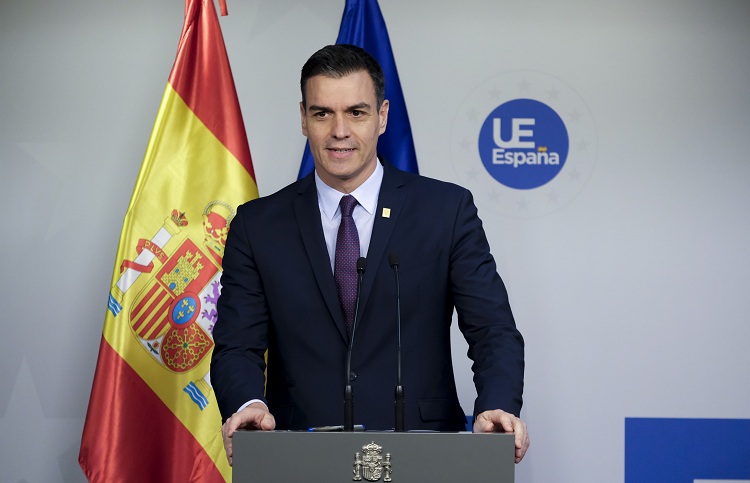Eduardo González
The Ministry of Foreign Affairs has included among the “most relevant challenges for the coming months” the preparation of the Spanish Presidency of the Council of the EU, which will be held in the second half of 2023 and should therefore coincide with the end of Pedro Sánchez’s current term of office and with the holding of the general elections.
This was assured by the Department headed by José Manuel Albares on the occasion of the publication of the report Cumpliendo, the very self-congratulatory report of activities presented last Friday by the Government of Pedro Sánchez and which states, among other things, that the Ministry of Foreign Affairs implemented, in the first half of the year, “98% of its commitments”.
“For the coming months, the most relevant advances will be the preparation of the Spanish Presidency of the EU Council in the second half of 2023, the beginning of the deployment of the consular digitalization plan and the execution of the international donation campaign of vaccines committed by the Government”, the Ministry assured in a press release on the occasion of the presentation of Cumpliendo. “Although the Presidency of the Council of the EU is not scheduled until the second half of 2023, the volume of work involved makes it advisable to start preparations at this time, identifying priorities and adapting the institutional structure”, it continued.
“To the usual responsibilities of the Presidency, such as the preparation and organization of meetings or the organization of summits, is added the fact that the Spanish Presidency will be the last full Presidency before the European Parliament elections, scheduled for May 2024, so it will be a key period to reach consensus and successfully complete the European legislature”, added the Ministry, who recalled that, “so far, Spain has held the Presidency on four occasions, the last of them in 2010”.
Last July 12, José Manuel Albares declared, in his inaugural speech, that Spain is a country “with a voice and weight in Europe” and, therefore, has to “continue building Europe”, especially in view of the prospect of “the Presidency of 2023, in which we have to give the best of ourselves for Spain and for Europe”. Spain will assume the Presidency of the Council of the EU in the second half of 2023, in the final stretch of the current legislature. Until then, the Presidency will be held by Slovenia (currently), France, the Czech Republic and Sweden. Spain will be succeeded by Belgium.
“98% of commitments”
In the part corresponding to Foreign Affairs, the rest of the report Cumpliendo assures that the Ministry “has implemented in the first half of the year 98% of its commitments and has fulfilled a third of its objectives”, among them “the approval of the Foreign Action Strategy 2021-2024, the development of a National Action program in relation to the 75th anniversary of the United Nations and the promotion of greater autonomy of the European Union and greater coordination in security matters”. The first half of the year was entirely under the responsibility of the previous minister, Arancha González Laya.
In the area of migration, according to the document, “greater cooperation with countries of origin of immigrants” has been achieved and Spain “has urged the EU to collaborate effectively with African countries to prevent irregular immigration”. Likewise, it has participated in Talent Partnerships, an initiative within the New Pact on Migration and Asylum “of which Spain is a promoter”, and different issues of the bilateral agenda have been addressed with Ghana and Guinea, “among which the migratory issue stands out”.
The Ministry also boasts with the “boost to relations with Latin America with two trips of HM the King to the inaugurations of the presidents of Ecuador and Peru, from where he has just returned with the Minister José Manuel Albares, and the President of the Government on official visits to Argentina and Costa Rica”. “To this must be added official visits to Venezuela, Colombia, Brazil and Paraguay” and the “meetings of the mechanism of bilateral consultations with El Salvador and Honduras”, it continues.
In addition, the Foreign Office includes as objectives achieved Spain’s participation in the XXVII Ibero-American Summit, held on April 21 in Andorra, “where the Framework Agreement for the promotion of the circulation of talent in the Ibero-American space was signed and the Spanish Cooperation Scholarships portal was presented”, and the first meeting of the Ibero-American Network of Cultural Diplomacy was held in Toledo.
As for other challenges, in addition to the 2023 European Presidency, Foreign Affairs assures that work will begin to implement the consular digitalization plan, within the framework of the National Recovery and Resilience Plan, and recalls that the Ministry will also have to manage the international vaccine donation campaign within the framework of the Solidarity Vaccines plan announced by the President of the Government. “The necessary coordination is being worked on to make it possible to send up to 22 million vaccines to the recipient countries”, the report assures.
Among the initiatives launched that are still pending completion, the presentation of the candidacy to the Human Rights Council for the period 2025-2027, whose vote will be in the fall of 2024; and the need to continue advancing in the adoption of a feminist foreign policy, stand out. Work has also continued to promote the Valencian base of Quart de Poblet as a UN technology hub. On September 1, 2020, the construction of OF3 began, “whose works are progressing on schedule despite the COVID-19 pandemic”. The UN Secretary General, António Guterres, visited Quart de Poblet on July 1 and 2.






